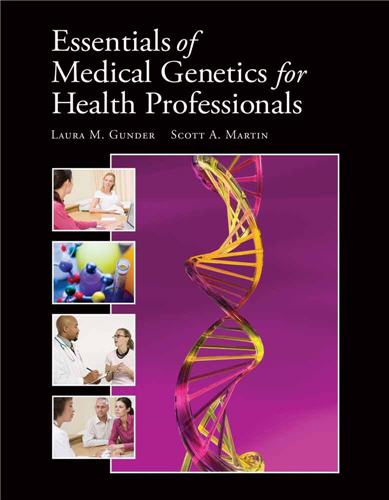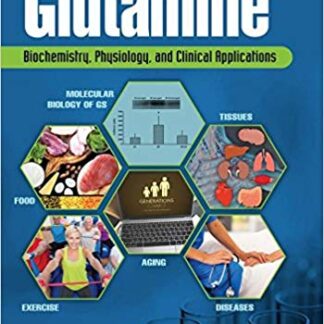Description
Essentials of Medical Genetics for Health Professionals by Laura M. Gunder, ISBN-13: 978-0763759605
[PDF eBook eTextbook]
- Publisher: Jones & Bartlett Learning; Genetics ed. edition (October 1, 2010)
- Language: English
- 236 pages
- ISBN-10: 0763759600
- ISBN-13: 978-0763759605
Essentials of Medical Genetics for Health Professionals is a concise, accessible introduction to medical genetics for all health professions students. Even with limited exposure to genetics, students can use the accelerated approach in this text to attain a base foundation of genetics knowledge. This book begins with a review of chromosomes, DNA, RNA, protein synthesis, and inheritance patterns and continues with a clinical focus based on understanding different disease processes. A variety of genetic diseases are explored, including what is known about the genetics involved, the signs and symptoms of the disease, and the treatment options available. Accompanying tables and images aid comprehension. This book also covers diagnostic techniques and an overview of embryonic development and teratogens. The roles of genetic counseling and screening, as well as the ethical and legal issues related to genetic screening and genetic testing are also discussed. Complete with stated objectives, definition of key terms, references, chapter summaries and end of chapter review questions with answers, each chapter is organized for optimal learning.
Essentials of Medical Genetics for Health Professionals will not only have application in the classroom setting for health professions or medical students, but practicing clinicians such as physician assistants, nurse practitioners, and physicians who want to learn more or revisit genetics will also find this book a valuable, useful resource.
Table of Contents:
Preface xi
CHAPTER 1 Introduction 1
Basic Genetics 1
Mutation 3
Nondisjunction Syndromes 5
Genes in Individuals 8
Inheritance Patterns 9
Human Genome Project 15
Chapter Summary 16
Key Terms 17
Chapter Review Questions 19
Resources 19
CHAPTER 2 Diagnostic Techniques in Medical Genetics 21
Family History 21
Pedigree Analysis 21
Cytogenetic Studies 24
Fluorescence in Situ Hybridization 25
DNA Analysis 27
Biochemical Analysis 27
Chapter Summary 28
Key Terms 28
Chapter Review Questions 29
Resources 29
CHAPTER 3 Development and Teratogenesis 31
Embryonic Development 31
Implantation 31
Congenital Abnormalities 34
Thalidomide 36
TORCH Complex 37
Fetal Alcohol Syndrome 38
Tobacco 39
Cocaine 40
Vitamin A 40
Diethylstilbestrol 41
Chapter Summary 41
Key Terms 42
Chapter Review Questions 43
Resources 43
CHAPTER 4 Neurodegenerative Diseases 45
Alzheimer’s Disease 45
Huntington’s Disease 47
Chapter Summary 49
Key Terms 50
Chapter Review Questions 50
Resources 50
CHAPTER 5 Hereditary Breast and Ovarian Cancer Syndrome 53
Breast Cancer Genes 53
Founder Effect 55
Penetrance 56
Rare Syndromes Associated with Breast and Ovarian Cancer 56
Management Options 57
Genetic Testing 58
Chapter Summary 58
Key Terms 59
Chapter Review Questions 60
Resources 60
CHAPTER 6 Colorectal Cancer 61
Familial Colorectal Cancer 62
Hereditary Colorectal Cancer 63
Familial Adenomatous Polyposis 63
Hereditary Nonpolyposis Colorectal Cancer 64
Chapter Summary 66
Key Terms 67
Chapter Review Questions 68
Resources 68
CHAPTER 7 Chronic Myelogenous Leukemia 71
Major Phenotypic Features 71
Genetics of Chronic Myelogenous Leukemia 72
Phases of Chronic Myelogenous Leukemia 73
Treatment 73
Prognosis 75
Chapter Summary 75
Key Terms 75
Chapter Review Questions 76
Resources 77
CHAPTER 8 Hemophilia 79
Genetics of Hemophilia 80
Diagnosis 81
Genetic Testing and Counseling 82
Management and Treatment 83
Associated Syndromes 84
Chapter Summary 85
Key Terms 86
Chapter Review Questions 87
Resources 88
CHAPTER 9 Sickle Cell Disease 89
Genetics of Sickle Cell Disease 89
Phenotypic Features 90
Clinical Diagnosis and Testing 91
Other Sickle Cell Disorders 92
Management and Treatment 92
Genetic Counseling 93
Chapter Summary 94
Key Terms 94
Chapter Review Questions 95
Resources 95
CHAPTER 10 Hemochromatosis 97
Phenotypic Features 97
Genetics of HFE-Associated Hemochromatosis 98
Diagnosis 98
Genetic Testing and Counseling 100
Management and Treatment 101
Associated Syndromes 102
Chapter Summary 102
Key Terms 103
Chapter Review Questions 104
Resources 104
CHAPTER 11 Cystic Fibrosis 107
Phenotypic Features 107
Genetics 109
Diagnosis 110
Genetic Testing and Counseling 111
Management, Treatment, and Surveillance 111
Associated Syndromes 112
Chapter Summary 113
Key Terms 113
Chapter Review Questions 114
Resources 114
CHAPTER 12 Familial Thoracic Aortic Aneurysms and Dissections 115
Diagnosis 116
Genetic Testing and Counseling 119
Management and Treatment 120
Associated Syndromes 121
Chapter Summary 121
Key Terms 122
Chapter Review Questions 122
Resources 123
CHAPTER 13 Familial Hypercholesterolemia 125
Genetics 125
Environmental Risk Factors 126
Physical Examination Findings 126
Related Disorders 127
Environmental and Other Factors 128
Testing 128
Management and Surveillance 129
Chapter Summary 134
Key Terms 134
Chapter Review Questions 135
Resources 135
CHAPTER 14 Hereditary Cardiomyopathies 137
Diagnosis 138
Genetic Testing and Counseling 141
Management and Treatment 141
Associated Syndromes 142
Chapter Summary 143
Key Terms 144
Chapter Review Questions 144
Resources 144
CHAPTER 15 Marfan Syndrome 147
Phenotypic Features 147
Genetics of Marfan Syndrome 148
Diagnosis 148
Genetic Testing and Counseling 150
Management and Treatment 151
Associated Syndromes 151
Chapter Summary 152
Key Terms 152
Chapter Review Questions 152
Resources 153
CHAPTER 16 Polycystic Kidney Disease 155
Phenotypic Features 155
Genetics 157
Diagnosis 158
Genetic Testing and Counseling 159
Management, Treatment, and Surveillance 159
Associated Syndromes 160
Chapter Summary 161
Key Terms 161
Chapter Review Questions 162
Resources 162
CHAPTER 17 Neurofibromatosis 165
Genetics of Neurofibromatosis 166
Diagnosis 167
Medical Management 170
Chapter Summary 171
Key Terms 171
Chapter Review Questions 172
Resources 172
CHAPTER 18 Familial Malignant Melanoma 173
Environmental Factors 173
Phenotypic Features 174
Genetics 174
Diagnosis 175
Genetic Testing and Counseling 177
Associated Diseases 177
Management and Treatment 178
Chapter Summary 179
Key Terms 180
Chapter Review Questions 180
Resources 181
CHAPTER 19 Pharmacogenomics 183
Drug Metabolism 184
Pharmacogenomic Tests 186
Limitations and Ethical Issues 187
Chapter Summary 188
Key Terms 188
Chapter Review Questions 189
Resources 189
CHAPTER 20 Gene Therapy 191
Basic Process 191
Types of Gene Therapy 192
Viruses as Gene Therapy Vectors 193
Challenges Associated with Viral Vectors 195
Recent Progress 198
Chapter Summary 198
Key Terms 199
Chapter Review Questions 200
Resources 200
CHAPTER 21 Ethical, Legal, and Social Issues 203
Genetic Testing 203
Confidentiality 205
Conclusion 207
Chapter Summary 208
Key Terms 209
Chapter Review Questions 209
Resources 209
Glossary 211
Index 223
Laura M. Gunder, DHSc, MHE, PA-C serves as a Director of Research and Faculty Development in the Physician Assistant Department at Georgia Health Sciences University (formerly the Medical College of Georgia). She is a three time graduate of the Medical College of Georgia, having matriculated through the Clinical Laboratory Science program, the Physician Assistant program and the Master of Health Education program. Her entrance into healthcare began in the clinical laboratory profession in 1989 and besides her clinical experiences as a laboratorian and clinician, she has also worked as a patient educator, a medical writer, course developer and a consultant. Dr. Gunder McClary received her Doctor of Health Science degree from Nova Southeastern University in Fort Lauderdale, Florida. She serves on faculty at August University in Augusta, Georgia She is the founder of Guardian Health Partners, LLC which provides medical education consulting services and primary care services through medical house calls.
What makes us different?
• Instant Download
• Always Competitive Pricing
• 100% Privacy
• FREE Sample Available
• 24-7 LIVE Customer Support




